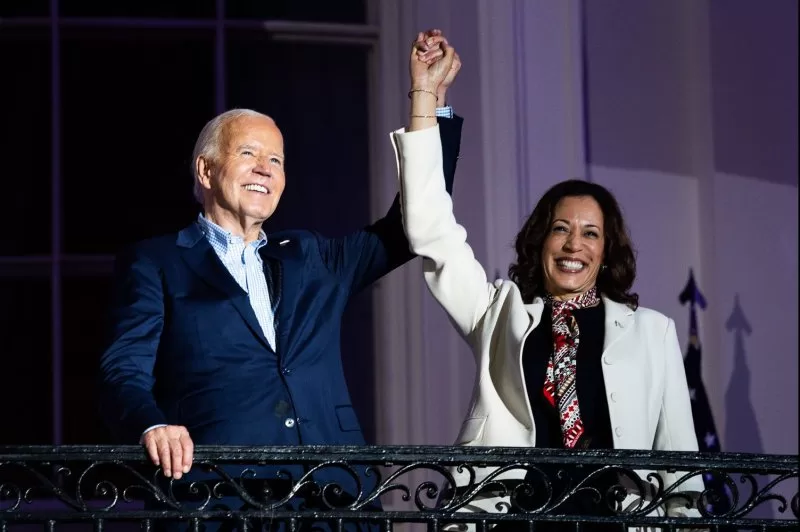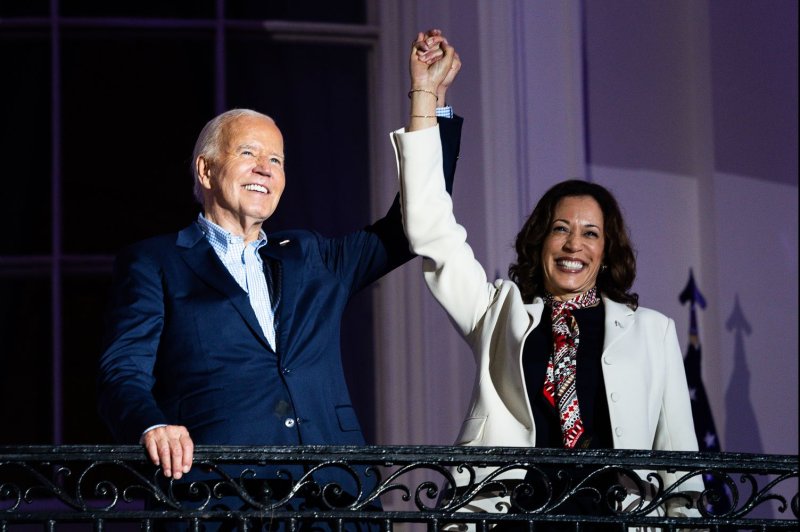1 of 3 | President Joe Biden and Vice President Kamala Harris appear on the Truman Balcony of the White House in Washington, D.C., to view the Independence Day fireworks display over the National Mall on July 4. Photo by Tierney L. Cross/UPI |
License PhotoJuly 25 (UPI) — The Democratic Party has passed the rules for nominating its new presidential candidate after President Joe Biden‘s announcement that he will not seek re-election.
The Democratic National Convention rules committee passed the rules Wednesday by a 157-3 vote, preparing for a virtual roll call vote.
“The work ahead may be unprecedented, but we are prepared to undertake a transparent, swift, and orderly process to move forward as a united Democratic Party with a nominee who represents our values and will lead us to victory in November,” Jaime Harrison, Democratic National Committee chairman, said in a statement.
Democratic governors, lawmakers and Biden have largely rallied around Vice President Kamala Harris to step in as the new nominee but nothing is official yet. The candidate will be formally selected at the Democratic National Convention, beginning on Aug. 19 in Chicago, just as it would have if Biden remained in the race.
The difference is in what that process will look like at this stage.
“The party can select an alternative candidate by any means that it wishes, subject to being ratified in the party bylaws,” Samuel Issacharoff, Bonnie and Richard Reiss professor of constitutional law at New York University, told UPI.
The Democratic Party’s primary is over and Biden earned 3,896 of 3,949 pledged delegates. Candidates who earn delegates but do not wish to continue their campaign usually release their delegates at the convention so they may unify behind the party’s candidate. Candidates typically do this when they are the runner up, not the primary winner.
If Biden remained in the race the convention would be a formality to name him the party’s nominee. Instead it will be an open convention with no predetermined nominee.
Virtual roll call
Democrats who wish to be candidates for the nomination have until Saturday at 6 p.m. ET to file their declaration of candidacy with the secretary of the DNC.
According to the Democratic National Committee bylaws, to earn that nomination, Harris or any other presidential hopeful must receive signatures from at least 300 delegates but not more than 600. No more than 50 delegate signatures can come from a single state. More than a dozen candidates could theoretically meet the qualifications.
Candidates have until Tuesday to meet these qualifications.
If there is only one eligible candidate, voting will begin electronically on Aug. 1. If there are multiple candidates, voting will begin at a later date selected by the DNC.
Shana Gadarian, professor of political science at Syracuse University, told UPI that delegate votes will be directed by their respective state parties.
“They themselves are part of the party apparatus,” she said. “As with everything in politics in the United States, everything comes from the states. Occasionally you see a delegate make an individual decision and decide to vote for somebody else but that’s pretty rare.”
Only pledged delegates can vote in the first round of voting. If there is a tie and a nominee is not named after the first round the 747 superdelegates will be included in subsequent votes.
Superdelegates are automatically seated delegates. They are leaders of the party and elected officials, such as governors and lawmakers.
Superdelegates are free to vote as they choose, though many have endorsed Harris.
Votes at the convention will be ceremonial with a state-by-state roll call to affirm the nomination.
New primary ‘out of the question’
There were few other less likely routes toward choosing a candidate. Holding a new primary was an impractical, if not impossible choice with less than four months until the election. Primary elections are also expensive for state parties, costing millions. Presidential primaries cost taxpayers more than $427 million.
“A primary as we think of it is probably out of the question,” Stephen Ansolabehere, Frank G. Thomas professor of government at Harvard, told UPI. “Some pre-convention vote may not be and there is a sort of idiosyncratic reason why.”
The pre-convention vote the DNC decided on meets the need to have a candidate on the ballot in Ohio by Sept. 1. Secretary of State Frank LaRose’s office said this is required to ensure ballots, including absentee ballots, can be printed on time.
Ohio Democrats called for an earlier decision, asking that a candidate be named by Aug. 7. This has given rise to the idea of a pre-convention virtual roll call vote. The vote would poll delegates on their selection. However, this plan was discussed when it was believed the candidate would have been made clear through the primary.
Republican, legal challenges
Some notable Republicans have threatened to challenge Biden’s removal from the ballot in court. House Speaker Mike Johnson, R-La., said during an interview on ABC News it would be “unlawful” to change candidates.
“Fourteen million Democrats voted to make Joe Biden the nominee,” Johnson said on This Week. “So, it would be wrong and I think unlawful in accordance to some of these state rules for a handful of people to go in the backroom and switch it out because they’re — they don’t like the candidate any longer.”
Issacharoff, co-author of The Law of Democracy, Legal Structure of the Political Process, said Johnson’s argument has “very little foundation.”
“What Republicans are pointing out is that the selection of a candidate for the party’s nominee is governed by state law on a state-by-state basis,” he said. “No state has yet allowed Biden to be the Democratic nominee for the very simple reason that he has not yet been selected as the Democratic nominee.”
Then there is the matter of campaign contributions. The Biden-Harris campaign raised hundreds of millions prior to the president’s announcement on Sunday. Those contributions now shift toward supporting Harris for president.
Former President Donald Trump has filed a complaint with the Federal Election Commission in an attempt to block the transition of funding.
Lonna Atkeson, director of the Leroy Collins Institute at Florida State University, told UPI she does not expect any significant legal hurdles on the issue of campaign funding. The FEC has already updated the campaign to reflect Harris For President as the recipient of more than $296 million. In a campaign email on Tuesday, Harris For President touted raising more than $100 million since Sunday afternoon.
“If it’s the Biden-Harris campaign I think it’s probably not a big hurdle there,” Atkeson said. “If you wanted to transfer that to Pete Buttigieg or Gavin Newsom, that might be a little more complicated.”
Atkeson said the bigger challenge may be gaining the support of would-be Biden voters such as those who voted for him in the primary.
“It seems to me, from a voter’s perspective, there’s lots of cause for concern,” she said. “Some may feel they did not get to participate in that democratic process.”
“We’re still in a constitutional crisis as far as I’m concerned because we have someone as President of the United States who is not capable of performing his function right now,” Atkeson continued. “We’re all sort of aware that Biden is not capable of running. Is he capable of being president? I think Kamala Harris should become acting president right away.”
Historical precedent
Peter Loge, director of the School of Media and Public Affairs at George Washington University, does not agree. Instead, he believes Biden has chosen to focus on being president rather than running for re-election.
“Running for president and being president are both full-time jobs,” Loge told UPI. “Biden’s got what it takes to make a difference where it matters. He just doesn’t have the juice to do both things all at the same time.”
The months to come before Nov. 5, have little precedent. The experts interviewed by UPI cited the convention of 1968 as perhaps the closest parallel. It is the most recent contested convention in American history.
President Lyndon B. Johnson announced in January 1968 that he would not seek re-election. The year was marked with unrest, heightened by the assassinations of Martin Luther King Jr. and Sen. Robert F. Kennedy, who was running for president.
The DNC was held in Chicago at the International Amphitheatre with thousands of demonstrators outside protesting against the Vietnam War, racism and poverty. Amid the chaos, Vice President Hubert Humphrey was nominated over Sen. Edmund Muskie in a contentious convention.
“Anybody that tells you they know exactly what’s going to happen, they’re either lying, delusional or both,” Loge said.

